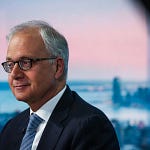
Backstage
Covid might be waning in the US, but the largest country in the world remains uniquely vulnerable. China has pursued a zero-Covid policy that has resulted in non-existent herd immunity. With its economy slowing, how does China reopen without risking sudden, devastating exposure to the virus?
This week’s guest is an expert I have followed for a long time, Yanzhong Huang, who is Senior Fellow for Global Health at the Council on Foreign Relations and Professor at Seton Hall University. He writes extensively about global public health and China’s health care system in Foreign Affairs and major publications. More than fifteen years ago, I heard Prof Huang speak about the incredibly high rates of physical assault against Chinese doctors by their patients, estimated at over 80% over the past year. China’s health care system is highly centralized, with many chokepoints that limit patient access. This has resulted in violent expressions of frustration.
Huang made several key points during our podcast:
For now, China is sticking to its zero-Covid policy. It requires isolation from the rest of the world, and imposes burdens on its economy. Abandoning the policy is inevitable, but could be costly for the Chinese who are now the world’s most vulnerable population in terms of exposure to the disease.
Although Covid has been largely contained, overall excess deaths have increased, probably due to resources that have been shifted away from treatment for non-communicable diseases such as diabetes and cardiovascular disease. It is estimated that half of China’s population is diabetic or pre-diabetic- the largest number of patients with this disease in the world.
Recently there has been a flood of new regulations on many industries in China. More than half of Chinese hospitals are now private. Similar to the education sector, the government is seeking greater control not just through regulation, but through price controls that will drive out weaker players.
China’s demographic challenges are severe. Only 12 million babies were born last year in a nation of 1.4 billion people, and some say even that number is far too high. Absent economic incentives, does the new 3-child policy have any hope of success?
How does all of this relate to what is going on in Russia and Ukraine? More in our next newsletter, but big picture, if two major countries such as China and Russia choose self-isolation, either voluntarily or involuntarily, the entire world will be impacted. Both China and Russia are nuclear powers with declining populations and enormous internal challenges. Will we see a bifurcated world with two financial markets, payment systems, two communications channels, restricted energy distribution, two transportation authorities, and two kinds of technological development and standards? If we do, the world will probably grow more slowly, and globalization as we have known it will never be the same. The causes, war or disease, could have equal effects.
Books & Articles by Yanzhong Huang
2020
Toxic Politics - China’s Environmental Healthcare Crisis and Its Challenge to the Chinese State
In this book, Yanzhong Huang presents new evidence of China's deepening health crisis and challenges the widespread view that China is winning the war on pollution.
2015
Governing Health in Contemporary China (China Policy Series)
This book examines the political and policy dynamics of health governance in post-Mao China. It explores the political-institutional roots of the public health and health care challenges and the evolution of the leaders’ policy response in contemporary China.
Feb. 3, 2022 / Washington Post
China courted the world the last time it hosted the Olympics. Not now.
Fourteen years after the last Olympics in Beijing, China’s leaders simply see less reason to welcome foreigners, or foreign ideas, into the country.
February 2022 / Council on Foreign Relations
The COVID-19 Pandemic and China's Global Health Leadership
China’s vulnerability in maneuvering for global health leadership during the COVID-19 pandemic presents the United States with an opportunity to reassert its global leadership
Aug. 12 ,2021 / Foreign Affairs
The Right Way to Investigate the Origins of COVID-19
Only an independent coalition of scientists can reach a definitive answer.
Global Healthcare News & Analysis
Feb. 24, 2022 / 4sight Health
Kerry Weems
Death numbers are impossible to fake but are open to interpretation. That’s where the political debate becomes heated. The politization of pandemic’s death counts has produced doubt, division, and denial. A close examination of the 2020 death data clarifies what actually did and did not happen in 2020. It also raises profound health policy questions regarding strategies for minimizing excess deaths going forward.
Feb. 19, 2020 / China Daily
China endorses vaccine mixing to build herd immunity
Wang Xiaoyu
China has begun mixing and matching different COVID-19 vaccines to reinforce herd immunity against the novel coronavirus after fully vaccinating over 1.23 billion people, the National Health Commission said.
Feb. 16, 2022 / Newsweek
The Rift Between the U.S. and China Is a Global Health Hazard
Fred Guterl
In the realm of pandemic prevention, cooperation is key. Nations are far better at fighting pandemics when they collaborate than when they go it alone. The COVID-19 pandemic may have hurt the world's ability to fight the next pandemic, rather than improved it, in large part because U.S.-China relations have deteriorated.
Feb. 16, 2022 / Wall Street Journal
China’s ‘Zero-Covid’ Policy Holds Lessons for Other Nations
Greg Yip
Ever since China adopted its policy of stamping out every Covid-19 infection, outsiders have wondered whether it could last. With each new, more infectious variant, “zero Covid” has required more vigilant and frequent crackdowns on daily activity.
Feb. 21, 2022/ Time
What the World Can Learn from China’s COVID-19 Rules at the Winter Olympics
Chad De Guzman
Lessons on how to stage a virus-free international event can be learned from the Beijing Olympics, experts say, even in countries that don’t follow zero-COVID policies.
Feb. 2, 2022 / Zero Hedge
Chinese Scientists Discover "Godsend" Antibody Cocktail That Can "Neutralize" Omicron
Tyler Durden
According to the leader of the team that carried out the research, the scientists crafted a new antibody cocktail synthesized from human cells produced in response to infections with other variants. To their complete and utter surprise, they found that the cocktail produced an antibody that can magically combat omicron.
Jan. 30, 2022 / Bloomberg
Hong Kong's Covid-Zero Strategy Is on the Brink of Collapse
Michelle Fay Cortez, Jinshan Hong and Iain Marlow
Though the city has beaten back four previous waves of infection, returning to no Covid cases will be much harder this time, given it’s facing omicron, the most infectious and immune-evasive of variants.
With all best wishes for both health and peace,
Lyric
Lyric Hughes Hale
Editor-in-Chief
EconVue
Chicago
lyric@econvue.com
Twitter: @lyrichues
@HaleReport















Share this post